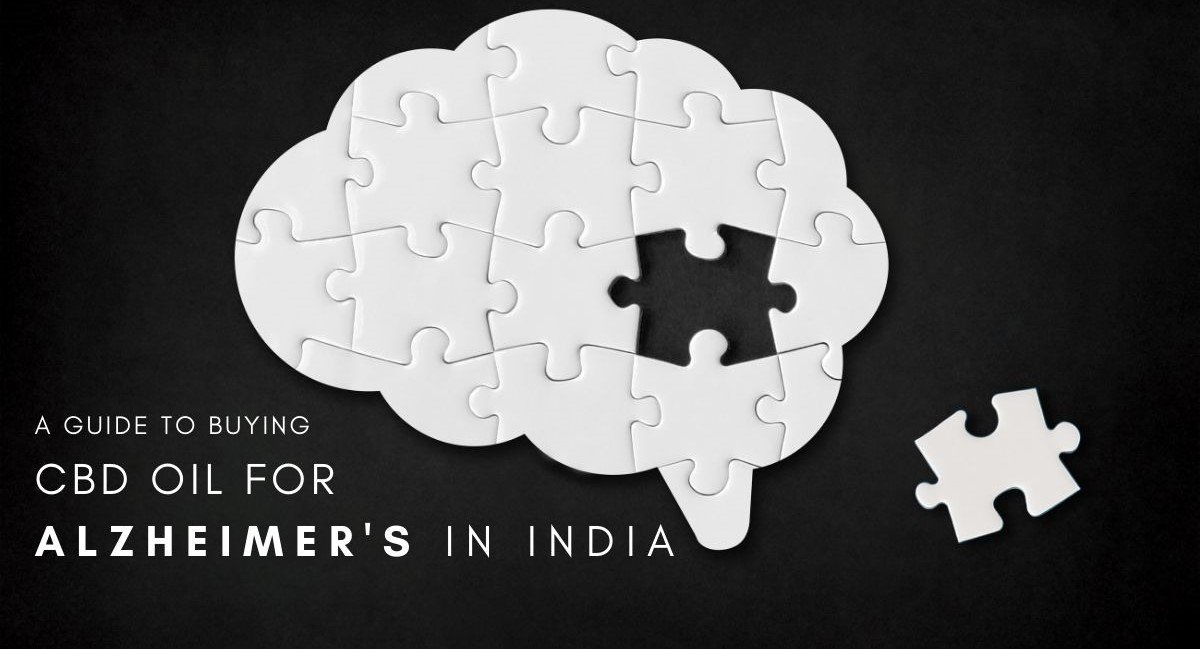What effects might CBD oil have on Alzheimer’s? For treating and lowering the behavioural and psychological symptoms of Alzheimer’s disease, CBD oil is a wholly plant-based treatment. Despite coming from the cannabis plant, it has no psychoactive properties.
This article explains how CBD oil treats Alzheimer’s disease and then provides information on where to purchase CBD oil for the disease in India.
Outline
What is dementia?
Alzheimer’s disease symptoms
Development of Alzheimer’s
-Mild/early-stage Alzheimer’s disease
> Purchase CBD Oil in India for Mild Alzheimer’s
-Mild Alzheimer’s
> Purchase CBD Oil in India for Moderate Alzheimer’s
-Severe or advanced Alzheimer’s
> Purchase CBD Oil in India for Severe Alzheimer’s
How can CBD oil treat Alzheimer’s disease?
Potential Alzheimer’s benefits of CBD oil
Alzheimer’s CBD Oil Types in India
How is CBD oil used to treat Alzheimer’s?
CBD Oil Dosage Guide for Alzheimer’s in India
FAQs about CBD oil for Alzheimer’s in India
What is dementia?
The degenerative neurologic illness Alzheimer’s disease results in the death of brain cells and brain tissue shrinkage. It is the most typical cause of dementia—a steady deterioration in thinking, acting, and social abilities that impairs a person’s capacity for independent functioning.
Alzheimer’s disease (AD) typically starts with memory loss before progressing to the loss of communication skills and the inability to react to the surroundings. It has an impact on the brain regions in charge of thought, memory, and language.
Age is the best-known risk factor for Alzheimer’s disease. Changes in the brain can begin years before the first symptoms appear.
People with AD may have trouble remembering things that happened recently or the names of the people they know.
Alzheimer’s Disease Signs and Symptoms
Alzheimer’s disease (AD) is a brain condition that slowly impairs one’s ability to think, remember, and reason. There are ten frequent Alzheimer’s symptoms and warning indications.
Memory loss that interferes with daily life includes losing recently acquired knowledge or significant dates and events, repeatedly asking the same question, and becoming more dependent on memory aides.
Having trouble following a well-known recipe or remembering to pay your bills on time are examples of planning or problem-solving challenges.
Having problems carrying out routine chores, such as organising a grocery list, travelling to a well-known place, or recalling the rules of a favourite game.
Losing track of seasons, dates, and the passage of time. Confusing place or time. Patients with AD may occasionally lose track of their location or how they got there.
Problems with distance judgement, recognising colour or contrast, reading traffic signs, etc. are examples of difficulties understanding visual pictures or spatial relationships.
New word challenges in speaking or writing include difficulty following or entering a conversation, difficulty with vocabulary, and calling a familiar object by the incorrect name (for example, calling a watch a “hand-clock”).
Losing the ability to retrace one’s steps after losing something means that one can no longer look for something after losing it.
Reduced or bad judgement, such as using poor judgement while handling money or giving less thought to personal hygiene.
Withdrawal from work or social engagements: A patient’s inability to hold or understand conversations may lead to their withdrawal from their hobbies, social engagements, or other activities.
Mood and personality changes: Patients may experience confusion, suspicion, depression, fear, or anxiety.
Individuals with Alzheimer’s experience different initial symptoms. One of the initial indications of cognitive decline caused by AD is frequently memory issues.
Developing Alzheimer’s disease
Preclinical, mild (or early-stage), moderate, and severe stages of Alzheimer’s disease are all stages of the illness’s progression (or late-stage).
Mild/Early-Stage Alzheimer’s Disease Symptoms
In this stage, a person may appear to be in good health but is having increasing difficulty understanding their surroundings. Issues may include:
1.No memory
2.decline in initiative and spontaneity
3.Making terrible decisions as a result of bad judgement
4.It taking longer to finish routine everyday tasks
5.difficulty managing finances and paying debts
6.Wandering and becoming disoriented
7.repeating inquiries
8.Putting things in strange places or losing things
9.Changes in mood and personality
10.increases aggressiveness, anxiety, or both

